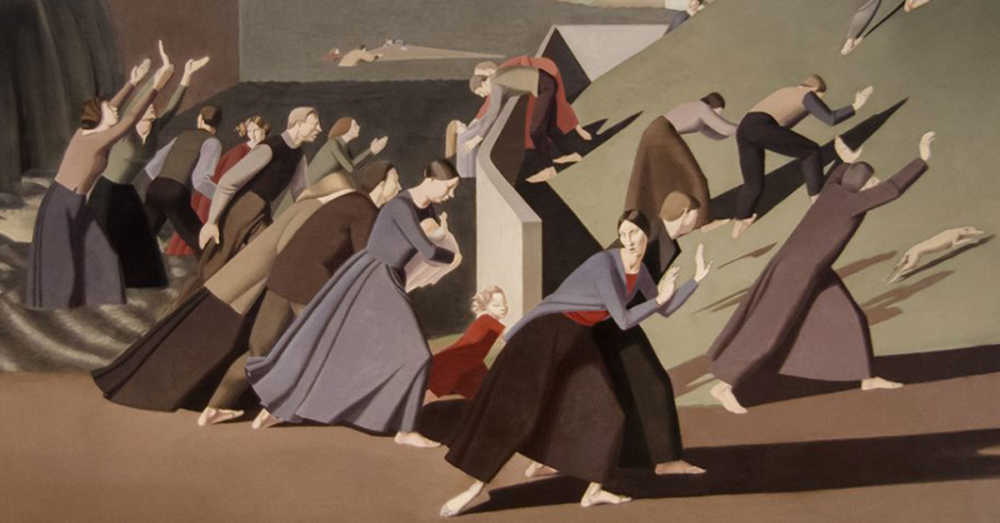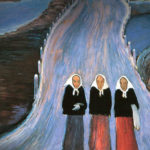We run our website the way we wished the whole internet worked: we provide high quality original content with no ads. We are funded solely by your direct support. Please consider supporting this project.

Is Your Church Promoting Tribalism?
It’s long been said that Sunday morning is the most segregated time of the week. Sadly, many have taught us that homogeneity is the way the church grows the fastest. But should we put up with this? In what follows, Greg lays out a biblical foundation for what he calls “reversing Babel.”
According to the biblical record, tribalism can be traced back to the infamous Tower of Babel. Several generations after the flood, humans were still living in one locale and had one common language and culture (Gen 11:1-2). Then someone came up with the brilliant idea that they should construct an enormous tower that would reach “to the heavens” in order to make a name for themselves and keep themselves unified (vss. 3-4).
The Lord saw what they were doing and said, “If as one people speaking the same language they have begun to do this, then nothing they plan to do will be impossible for them” (vs 5-6). What I hear the Lord saying is that if humans succeeded in erecting this idolatrous temple there would be no limit to the depth of evil they could sink to.
Theologically speaking, all the different phenotypic, cultural and national differences we see among diverse people groups today can be traced back to this divine judgment. Since all these people were entrapped in idolatry, it was inevitable that sooner or later some would try to get life from this distinctiveness of their tribe or nation. Tribalism, nationalism, and racism were born.
While people since Babel have had a tendency to exalt their human-centered, national uniqueness over others, God’s heart has always been to reverse Babel and bring nations together under him.
Isaiah prophesies of a day when “the mountain of the Lord’s temple will be established as the highest of the mountains” so that “all nations will stream to it” (2:2). He foresees a time when “all people” will behold “the glory of the Lord” (40:5) as they gather together at God’s “holy mountain” (56:7). This will be a time when “the Sovereign Lord will make righteousness and praise spring up before all nations” (61:11) as he gathers “people of all nations and languages” to “come and see my glory” and as he inspires “all people” to “come and bow down before” him (66:18, 23).
God’s “ways are not our ways,” (55:8-9) for our ways tend to be in line with Babel. It was true of ancient Israel, and it tends to be true of the Church today. Instead of attracting all others with our splendor, we repel them with our tribalistic superiority and self-righteousness. Fortunately, God’s ways always eventually triumph. And the one in whom they begin to triumph is Jesus Christ.
We get an idea of how central reversing Babel is to the Kingdom when we consider what happened on the first day the Church officially came into being—the day of Pentecost. Jesus had told his disciples he was going to leave them but that he would send the Holy Spirit to them. This promise was fulfilled 40 days later on the day of Pentecost. As 120 disciples were praying, the Holy Spirit came on them and they all “began to speak in other tongues as the Spirit enabled them” (Acts 2:1-4).
What’s particularly interesting about this episode is that there were people from many different countries visiting Jerusalem at this time, and they each heard the disciples speaking in their own native dialect (vs 6-12). The curse of Babel was being reversed. When the people inquired about what this meant, Peter explained that this was the fulfillment of the prophecy found in the book of Joel: “In the last days, God says, I will pour out my Spirit on all people” (vs 17).
This is the very first thing that happened when the Church was birthed! This passage teaches us that where the Spirit of God is present, where the reign of God is being established, where the Church is being the true Church—Babel will be in the process of being reversed. Where the Spirit is working, all the nationalistic walls that idolatrous humans have established will be losing all significance (Gal 3:28). Where the Spirit is working, the “one new humanity” that Christ died to bring about will be in the process of being manifested (Eph 2:14-16).
In other words, this passage reveals that reversing Babel is one of the most fundamental distinctive marks of the Kingdom. With his shed blood, Jesus “purchased for God members of every tribe and language and people and nation” (Rev 5:9). The Kingdom, therefore, is manifested whenever people are no longer defined by their Babel-originated tribe or nation, but only by their life-giving relationship with Jesus Christ and their belonging to God’s beloved community.
Category: Essays
Tags: Essay, Kingdom, New Humanity, Racism, Tribalism
Topics: Ethical, Cultural and Political Issues, The Church
Related Reading

Old Testament Support for the Warfare Worldview
Rebuking Hostile Waters Satan plays a minor role in the Old Testament relative to the New Testament. Instead, the warfare worldview in the Old Testament is expressed in terms of God’s conflict with hostile waters, cosmic monsters, and other gods.Like their Ancient Near Eastern neighbors, ancient Jews believed that the earth was founded upon and…

The Case for Annihilationism
Annihilationism is the view that whoever and whatever cannot be redeemed by God is ultimately put out of existence. Sentient beings do not suffer eternally, as the traditional view of hell teaches. While I am not completely convinced of this position, I think it is worthy of serious consideration. In this essay I will present…

The Cruciform Center Part 4: How Revelation Reveals a Cruciform God
I’ve been arguing that, while everything Jesus did and taught revealed God, the character of the God he reveals is most perfectly expressed by his loving sacrifice on the cross. Our theology and our reading of Scripture should therefore not merely be “Christocentric”: it should be “crucicentric.” My claim, which I will attempt to demonstrate…

The Rorschach Test
The choices we make will either increase or decrease our ability to recognize light when we see it. As we choose goodness, we increase our capacity for goodness. What do you see when you read the Bible or look at God or interact with others? Everything is a Rorschach test to some extent, revealing the light…

What are the different models of the Trinity in the Christian tradition?
The Psychological and Social Models of the Trinity The Bible teaches that there is only one God. At the same time, it teaches that the Father, Son, and Holy Spirit are each fully God. For this reason the church has always affirmed the doctrine of the Trinity, which teaches that God has one substance (ousia)…

